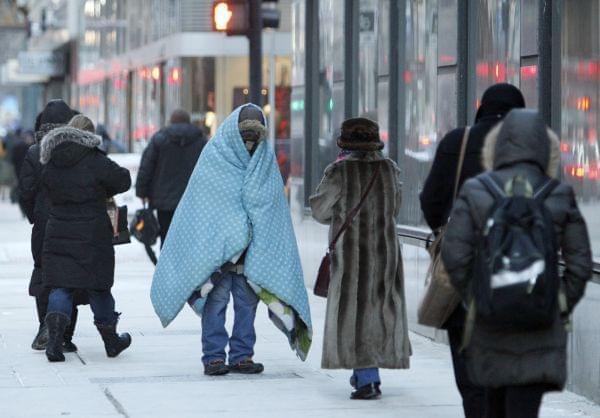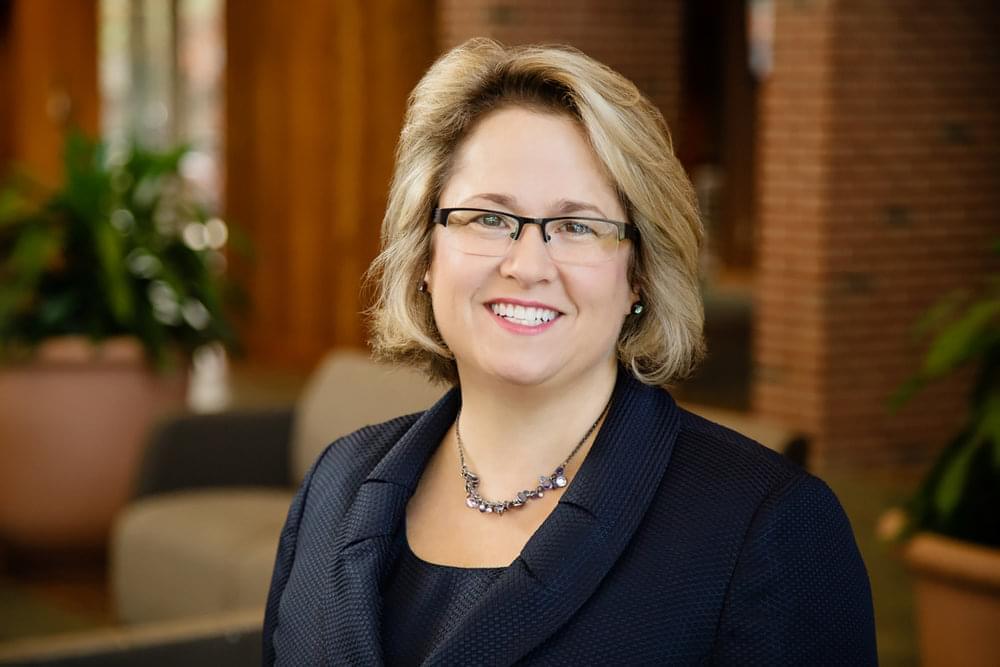Experts Gather To Discuss Link Between Poverty & Health, Explore Solutions

A homeless man who did not give his name bundles up in blankets Tuesday morning, Jan. 28, 2014, in downtown Chicago. Kiichiro Sato/AP
Poverty can lead to negative health outcomes, and a group of public health and policy experts will gather this week to craft a strategy to address the problem.
The events taking place in Urbana and Chicago this Thursday and Friday, respectively, are open to the public and hosted by the University of Illinois Epstein Health Law and Policy Program.

U of I law professor Robin Fretwell Wilson, director of the Epstein Health Law and Policy Program.
U of I law professor Robin Fretwell Wilson, director of the Epstein program, says the goal of the “Medicalization of Poverty” event is to explore how poverty is linked to negative health outcomes and work together to craft better policy.
Speakers at the panel discussion at 4 p.m. on Thursday at the U of I College of Law will include Wilson, U of I sociology professor Ruby Mendenhall and University of South Florida public health professor Marissa Levine.
The roundtable discussion at the U of I Discovery Partners Institute in Chicago will include Dr. Nirav Shah, former director of the Illinois Department of Public Health; Dr. Julie Morita, commissioner of the Chicago Department of Public Health; Levine; Utah State Senate Whip Daniel Hemmert; Andrea Garcia, director of science, medicine and public health at the American Medical Association; and a delegate from the office of U.S. Health and Human Services Secretary Alex Azar.
Wilson spoke with Illinois Public Media’s Christine Herman about what she hopes will come of these discussions.
This interview has been edited and condensed for clarity.
We thought if we could bring together the smartest people we know in health policy, who come at it from a 360-degree vantage; if we get all those people in the same room, I think we can do something really profound."Robin Fretwell Wilson
What does it mean that poverty has become medicalized?
Sort of two things. Think about the classic case of someone who is going to end up drawing a tremendous amount of healthcare resources, arguably, "unnecessarily." What I mean by that is a person who's homeless. So had we provided, let's say, housing support before the polar vortex, we wouldn't have all of these folks then showing up in emergency rooms with exposure potentially dying.
But it's a hard case to make to lawmakers; it's a hard case to make to anybody to spend money today in this climate, right? People don't want more taxes, or social safety nets are stretched thin. People, I don't know, maybe have hardened. And I think our hearts are kind of hard, and then a weird sort of way in America, and it's hard to remind people that there is a human dimension of the cost of not doing more for people in terms of treating them humanely.
It’s really hard to convince lawmakers to spend money in this climate, right? Homeless people don't really have an advocate.
So we thought if we could bring together the smartest people we know and health policy. If we could bring together people who are thoughtful, who come at it from a 360 degree advantage, whether they're in public health, whether they're lawmakers who have recently reformed Medicaid, to people like me, who are thinking and legal terms of legal boxes, to the amazing social scientists that we have at UIUC who are focusing on health disparities; If we get all those people in the same room, I think we can do something really profound, or we can figure out what that might be.
There's a second dimension of it, which is basically: Is there not what I call sort of a virtuous self interest in the healthcare system, to be more responsive to poverty? Think about what happens with a homeless person, right? We usually will do anything for this person until they presented the hospital. And they will have heroic measures to pull somebody back from the jaws of death.
And then what do we do? We discharge them right back where they were. So that's sort of like the second aspect of the medicalization of poverty.
So the idea is to bring together people from all these different sectors and brainstorm for ideas for solutions. Is that is that the idea?
That's basically the idea. And I think also sometimes we're doing things, but we're doing them, you know, kind of like in our own little cubicles, right? So I've got my thing going, and you've got your thing going? Well, what happens is we find the synergies between those, maybe we can actually have more impact for the same set of things that we're doing by, you know, thinking collaboratively about next steps, you know, and common enterprises. And as far as I can tell, we haven't done that.
What is your ultimate goal of having these conversations and bringing together these experts to discuss this issue?
I think we need just smarter policy, frankly. We need to find those creative solutions that are going to allow us to better leverage the resource investments that we've made. And I think we need to think hard about how we move those investments up earlier to treat people more humanely. And if we can make the case that there are there is the ability in the healthcare system, or there's a say, a self interest and doing that, then I think we will have come to a much better place.
Follow Christine on Twitter: @CTHerman
Links
- Dolton, IL and Suburban Poverty; More Scientists In Congress; Starved Rock Expansion; E-Cigarettes
- Schools Are Using Poverty Simulations To Build Empathy. But Do They Work?
- An Illinois Poverty Scorecard; People’s Gas Leak; AG Candidate Pat Quinn; Rural Economic Development
- First, Seek To Understand: Lessons In Poverty Teach Medical Students To Be Better Doctors
- Poverty/Household Income; Working In America; Illinois Politics
- The Poverty Industry; State Politics Review - The End Of The Budget Beard
- Childhood Well-Being And Poverty; The Corpse Flower; Hamilton, The Musical

